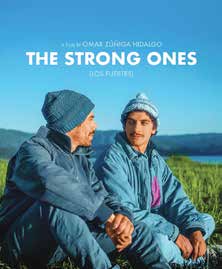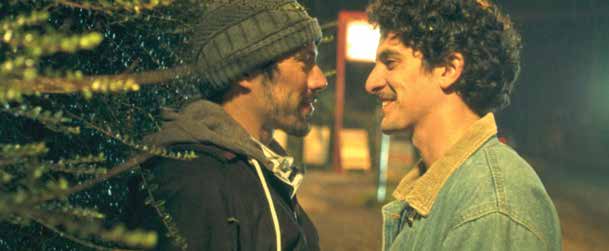
By Gary Kramer–
The passionate Chilean romance The Strong Ones, now out on demand and DVD, is cozy Valentine’s Day viewing. Writer/director Omar Zúñiga Hidalgo expands his terrific 2015 short, San Cristóbal, for this heartfelt feature about the relationship that develops between Lucas (Samuel González) and Antonio (Antonio Altamirano) in a coastal town in Southern Chile. The attraction between the two men is electric; the actors have tremendous chemistry. Viewers will likely melt just watching these guys gaze at each other. But their relationship may be temporary. The filmmaker chatted via Zoom with me for the San Francisco Bay Times about The Strong Ones.

Gary M. Kramer: Your film is very romantic. What can you say about the passionate elements in the film—the stolen kisses, and developing the intimacy between Lucas and Antonio? How did you find the balance between the longing and the rush of intense love?
Omar Zúñiga Hidalgo: When I first set out to make this film more than six years ago, I wanted to portray a love story that felt honest and genuine in a way that I hadn’t seen, and in a way that I feel we need more of. There’s an authenticity to the quality of the relationship between Lucas and Antonio. It has to do with them never denying what they feel or going through a moment of shame, or regret, or denial—which is something I keep seeing even today in 2021. I see this pattern in mainstream films and it just pisses me off.
I really wanted them to feel sure of who they are, whom they loved, and allow them to love in a way that is free and unapologetic. We wanted to make something that felt true to our experiences and the way that we love. We haven’t seen that love portrayed before. It has to do with desire, longing, and with finding something when you least expect it. The sex scenes in the film—it was important for us to go against the pattern of many things we have seen. We did not want them to have any shame, or pain, or trauma. We wanted them to feel passionate, and tender, and, most of all, pleasurable. Love is not linked to something you hide, but something that you celebrate. Through these scenes, you see how the men fall for each other, and their connection. They allow us to see how vulnerable they are with each other.
Gary M. Kramer: That said, there are elements of homophobia in the film. Can you discuss what it means to be gay in Chile?
Omar Zúñiga Hidalgo: For me it was important that the film portrayed a certain quality of the queer experience today in Chile. In the film, you see the complexity of it. We are halfway between an idea of progress and conservative attitude from the past. We have evolved quickly and there is more acceptance and equity than when I was growing up, but we have a long way to go.
In Chile, we don’t have marriage equality. We don’t have same-sex adoption rights. We have civil unions, and anti-discrimination laws. I wanted the film to show acceptance and support of same-sex relationship, and strange family tension; you see the hostility of a town and the bravery of people not being afraid of who they are and fighting for their place in their communities. We wanted to portray this in a way that was plausible in Chilean society today.

Queer people have difficulties all over the world. You can be killed or tortured in some places. We deserve to live the lives we want to live in the places we are in and the communities we choose. I hope we can all feel empowered to fight for ourselves for that space. That’s something that is very important to me. When you are in a place when your very existence is not a threat to people, you forget that others are not in that situation.
Gary M. Kramer: Speaking of space, there are rugged settings and warm scenes between the men. What can you say about the film’s atmosphere?
Omar Zúñiga Hidalgo: I wanted to set the film in southern Chile—the water, the ocean, the rain. I wanted that to feel authentic and real. The fort [where Antonio participates in historical reenactments] was a key element too. I set the film specifically there because there were all these forts built by the Spanish during colonial times that were key to the process of Chilean independence. There was an idea of resilience and resistance against the waves that keep crashing against you. I was drawn to that, and that was similar to Lucas and Antonio’s resilience. The space is important to them and creates parallels between the place they are in and what they are going through.
© 2021 Gary M. Kramer
Gary M. Kramer is the author of “Independent Queer Cinema: Reviews and Interviews,” and the co-editor of “Directory of World Cinema: Argentina.” Follow him on Twitter @garymkramer
Published on February 11, 2021
Recent Comments